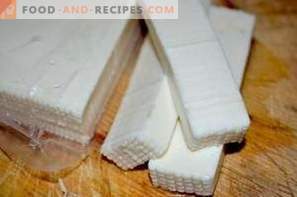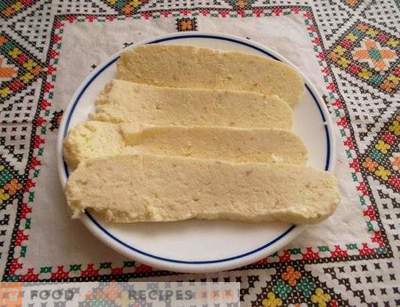
Cheese is a delicious, salty product with a spicy flavor. It is a “living” product, therefore it is important to follow certain recommendations when storing it. If the cheese is stored improperly, it will spoil before the expiration date - it will be covered with white bloom, will begin to crumble and lose its taste. So how to keep the cheese so that it remains fresh, tasty and does not lose the beneficial biologically active substances present in its composition?
Basic rules for storage of cheese in the refrigerator
- Cheese is very sensitive to temperature changes. For him, both low and high temperatures are destructive. Therefore, be sure to ensure that the temperature in the refrigerator is stable. Relative humidity also affects the safety of the cheese. If it is too low, the cheese dries up, and if it is high, harmful microorganisms begin to actively multiply in the cheese, which is why the product deteriorates very quickly. Cheese feels best at a relative humidity of 90%. Under the specified criteria fits the lower shelf of the refrigerator or a compartment for fruits and vegetables.
- When sending cheese to the fridge, remove it from cling film. She does not allow him to "breathe", as a result of which the cheese loses its taste properties. It is more correct to store cheese in parchment. Parchment gives the product to "breathe" and at the same time protects it from drying out. If you store the cheese in a plastic bag, then put a piece of refined sugar in it. Sugar will absorb excess moisture, saving the cheese, thus, from the formation of mold. Vacuum containers are also suitable for storing cheese.
- Cheese should be kept separate from strong-smelling foods, because it absorbs odors well. It is also not recommended to store different types of cheese alongside so that they do not interrupt the flavors of each other.
- The crust on the cheese protects the product and helps to preserve its flavor, so cut it off just before using the cheese directly. It is also worth noting that the cheese should be stored as a whole piece, and not cut it into small pieces.
- Never slice cheese in advance. This should be done immediately before serving. A word of advice: cheese will taste better if an hour lies at room temperature before it is consumed.
Can you store cheese in the freezer
Cheese in the freezer should be stored only in one case - if it is not going to be used in the near future. But only with this we should not forget that after freezing, most types of cheese crumble and it is desirable to use them only for cooking. When placing the cheese in the freezer, wrap it in foil or parchment paper. It is important that there are no other products next to the cheese, so that it does not absorb their smell. Cheese should be thawed a day before use in the refrigerator. By the way, the harder the cheese, the better it transfers frost. But soft pickled cheeses freeze is unacceptable. It is also important to note that cheese cannot be re-frozen, it is better to cut it into portions and use as needed.
How and how much to store different varieties of cheese
Hard and semi-hard cheese
Hard cheeses include such as “Parmesan” and “Edam”. The most famous representative of semi-hard cheese is Maasdam cheese. Cheese of these varieties should be stored in a refrigerator at a temperature of 1-7 degrees. In this case, they will remain fresh for 10-15 days. Throughout this period, make sure that the cheese does not form mold. If it does appear, do not rush to throw out the product - cut off the cheese at the place where the mold is formed. The rest of the cheese should be consumed as soon as possible, it is desirable to use it for cooking. Hard and semi-hard cheeses can be stored in the freezer for 3 months.
Soft cheese
Soft cheese, unlike solid and semi-hard, is stored in the refrigerator much less. Its shelf life after opening is 3 days at a temperature not higher than 7 degrees, if it lies in a sealed package. Without a sealed container, such cheese will quickly dry out and lose its taste. Soft cheeses: Mascarpone, Ricotta and others. Such cheese cannot be saved from mold.
Pickled cheese
Pickled cheese is the one that ripens in a special brine. Cheese of this type does not have a crust, so it can only be stored in a sealed package in which it was purchased, or in a weak solution of salt. It can be put in an enamel pan and pour salt solution. The solution is prepared in the following proportions: 200 grams of salt per 1 liter of boiled water. The solution should completely cover the cheese. If a film appears on the brine, it should be replaced with a new one. Pickled cheese will be fresh for several months if it is stored in an airtight container. When mildew forms, this cheese, like soft, must be thrown away. To remove excess salt from brine cheese, it needs to be cut and soaked in milk for about 8-10 hours. Pickled cheeses are: “Suluguni”, “Brynza”, “Feta” and others.
Blue cheese
Cheese produced with the noble mold should be stored in the refrigerator in the purchased sealed package. Packaging can be replaced with a container of plastic or glass, as long as it is tightly closed, otherwise the mold will spoil other products. At a temperature of 0 to 10 degrees, blue cheese is stored for about 7 days. The most famous blue cheese is “Roquefort”.
Homemade cheese
Cheese, cooked at home, should be stored in the refrigerator from 1 to 7 degrees for no more than 3-4 days. For storage of homemade cheese you need to use enameled glassware. Plastic bags are not suitable for this. If you want to keep such cheese longer, then freeze it. It will remain fresh in frozen form for several months.
Observe the specified terms and conditions of storage and enjoy the amazing taste and benefit of cheese.











































